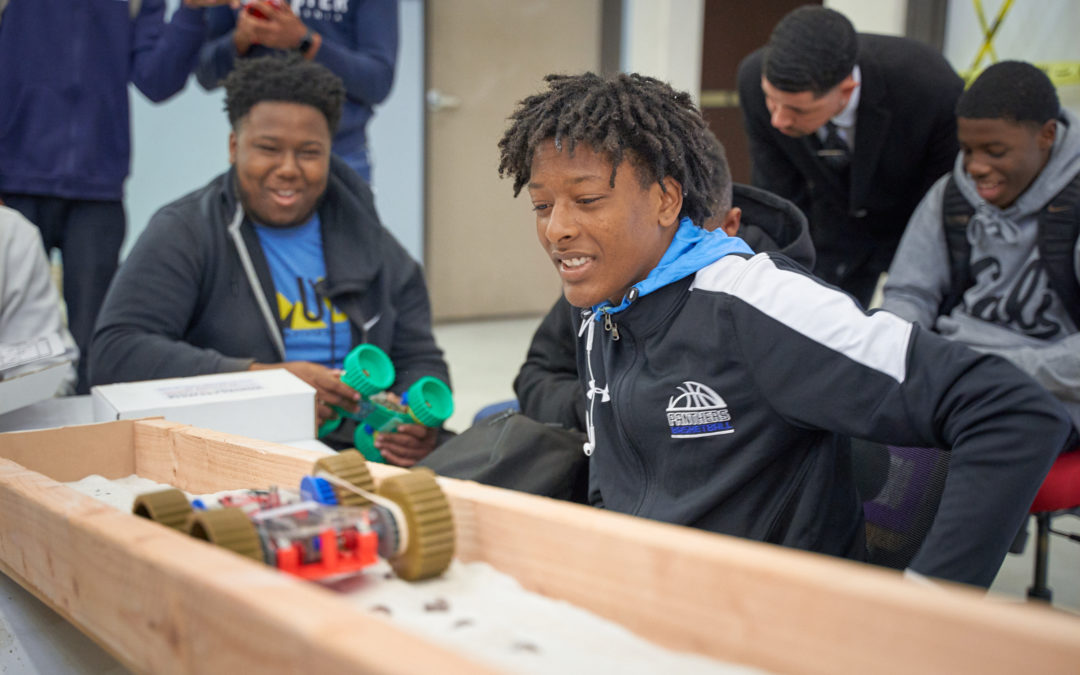Students Build and Test Mars Rovers Inspired by a NASA Challenge
By Christine Byrd, Communications Director
This spring, a group of 30 high school students from Long Beach used the Base 11 Innovation Center in Compton, California to build and test their own Mars rovers in a NASA-inspired STEM project.
The students from Jordan High School are part of the California State University, Long Beach-Long Beach Unified School District Math Collaborative (CSULB-LBUSD Math Collaborative). Created in 2011, the collaborative aims to support and encourage young African American men to attend and graduate from college. Currently, about one-third of black males who enroll in four-year colleges complete their degrees within six years, the lowest of any demographic group tracked by the National Center for Education Statistics.
On three separate visits, the students spent a full school day learning and working at the Base 11 facility, gaining hands-on experience in STEM and earning credit for their high school science class.
“The state-of-the-art equipment at the Base 11 Innovation Center introduced our young men to an engaging curriculum which they would not have been able to experience if it was not for the Base 11 program,” said Doris Robinson, Executive Director of the CSULB-LBUSD Math Collaborative, and a retired principal.
The students began in February, with a tour of Base 11’s Innovation Center and Tomorrow’s Aeronautical Museum. They stayed for a lesson on the significance of Mars in the 21st century, and critical contributions African Americans have made to space exploration.
Then the students split into groups of three, developed their team name and designed a logo, which was produced on the lab’s vinyl printer. The groups then assembled their own Mars rover using kits from INVENTORcloud, and affixed their logo to the body of their vehicle.

Malachi Scott shows off his team’s rover and the logo they created.
“When the students actually saw their creations come to life — from the logo to the wheels on the rover — you could see in their eyes they were having a ‘wow’ moment,” said Teniel Jones, Base 11’s Innovation Center Program Manager, who facilitated the hands-on lessons.
When the students returned to the Base 11 Innovation Center two weeks later, they were greeted by a wooden track filled with rocks and sand to mimic the martian landscape. The challenge: evaluate how their rover handled the track, and come up with better wheels — balancing the need for speed with the desire for power to overcome rocks like those found on the surface of Mars.
Following the seven-step engineering design process used by NASA, the students used what they learned about physics of motion and speed to plan improvement to the wheels on their rover. Then, they developed their own prototype wheel, using Fusion360, cloud-based computer-aided design (CAD) software by Autodesk, and had it produced on 3D printers in the facility.
“This was different than my classroom experience because we do not have as much time to work on projects like this, and it was away from the regular class,” said student Josiah Pierre. “We could interact better with our teams and it was much more fun and in-depth learning.”
Returning to the lab for the third time, the teams tried out their new wheels, taking their rovers for a spin on the track that simulated the ground on the Red Planet. To dig deeper into the physics concepts, the students then learned about friction and Newton’s Laws, and had the opportunity to design their own gears for the rover, and iterate on their wheel design once more.
Although the coronavirus pandemic prohibited the students from making their final presentation to friends and family, the students gained important skills from the experience.
“I thoroughly enjoyed the competition between the teams,” said student Jesse Jenkins. “Hopefully, we can complete the course next year so we can see whose Mars Rover will win!”
The experience was made possible for these students thanks to generous grants to Base 11 from the American Honda Foundation and Union Bank Los Angeles.
Click here to read more about programs and student experiences in Base 11 Innovation Centers.

